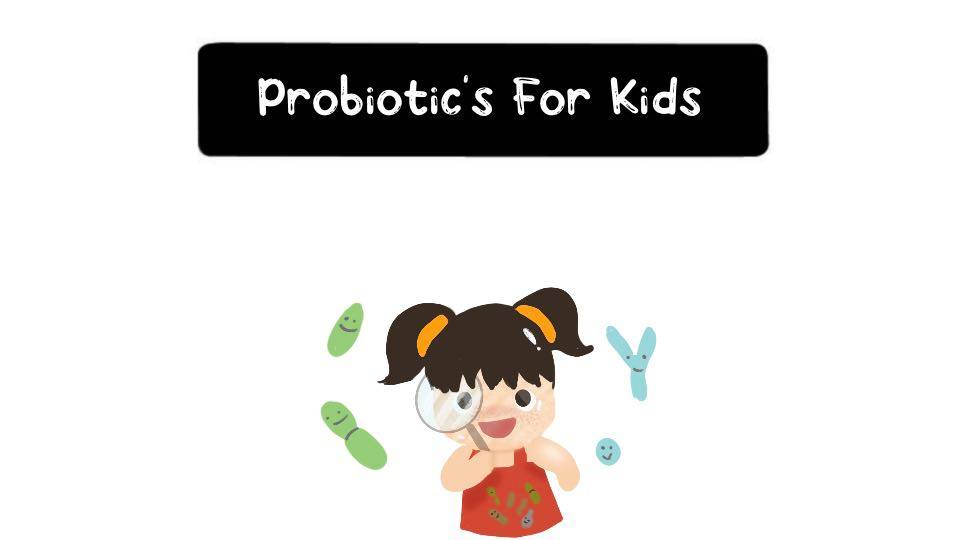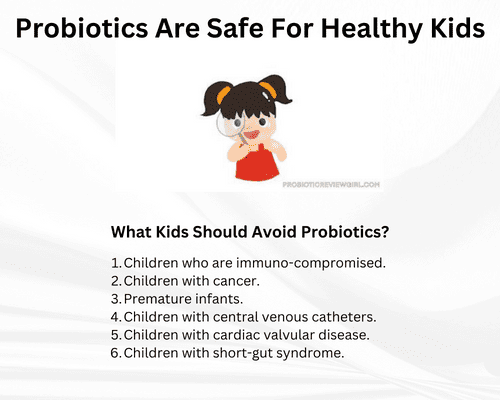Can Kids Take Probiotics?

Healthy kids can take probiotics to support antibiotic-associated diarrhea, constipation, eczema and overall digestive health in children. A healthy kid refers to a child who is in a good physical, mental, and emotional state, exhibiting normal growth and development, and free from significant illness or disease.
Probiotics can promote a balanced gut microbiome, aiding in nutrient absorption, strengthening the immune system, improving skin conditions, and modulating the gut-brain axis in kids.
Probiotics a type of friendly microorganism, are beneficial for children due to factors such as school, stress, poor diet, antibiotics usage, and busy lifestyles that can impact their gut microbiome.
Are Probiotics Safe For Kids?

Probiotics are generally safe for children, with a few exceptions. It is advised to avoid giving probiotics to children with compromised immune systems, cancer, or who are premature infants, as it may increase the risk of infections.
A 2018 review authored by I Hojsak, stated that caution is advised when using probiotics in premature infants, immunocompromised and critically ill patients, as well as those with central venous catheters, cardiac valvular disease, and short-gut syndrome.
Some common side effects of probiotics in kids include abdominal discomfort, diarrhea, nausea, vomiting, gassiness, and bloating. Long-term effects of probiotics on children are still not fully known, so it is recommended to use probiotic supplements as preventive remedies only if recommended.
Can Kids Take Adult Probiotics?
Yes, kids can take adult probiotics but they should use a lower CFU dosage since the dosage of probiotics for kids is typically lower than that for adults. Since there is currently no recommended or set dose for children, it is recommended to consult with a pediatrician to determine the appropriate probiotic supplement and dosage for a child. A pediatrician is a medical doctor who specializes in the care and treatment of infants, children, and adolescents.
Best Probiotic Strains For Kids?
The best probiotic strains for kids include a mix of Lactobacillus and Bifidobacterium species. "Probiotic use in children" authored by RJ Young found that, probiotics strains containing lactobacilli and bifidobacteria species are generally considered safe and may be particularly helpful in treating pediatric diarrheal illnesses.
A 2016 study authored by H Szajewska, found that probiotics have strain-specific effects, meaning that the efficacy and safety of probiotics can vary depending on the specific strains used. When choosing the best probiotic strain for kids you should pay close to attention to the strains used for the best health benefits.
Another 2016 study authored by K Korpela, found that long-term intake of Lactobacillus rhamnosus GG supplementation influences the composition of children's intestinal microbiota, increasing the abundance of beneficial bacteria and decreasing harmful bacteria which proves Szajewska's point.
What Is The Best Probiotic For A Child On Antibiotics?
The best probiotic for a child on antibiotics is Lactobacillus rhamnosus GG® and the yeast Saccharomyces boulardii according to 2020 study authored by T Yan. Other useful strains also include Lactobacillus acidophilus Rosell 52 and Lactobacillus rhamnosus Rosell 11 which both have been studied extensively.
Antibiotic-associated diarrhea is a condition characterized by the onset of loose or watery stools that occurs as a result of taking antibiotics, which disrupt the balance of beneficial bacteria in the gut.
What Is The Best Probiotic For Child Constipation?
The best probiotic strain for constipation in children according to research is soil-based Bacillus coagulans Unique IS2. A 2020 study authored by RS Madempudi, found that Bacillus coagulans Unique IS2, supplementation led to a significant increase in the number of bowel movements and improvement in stool consistency compared to the placebo group in children.
Childhood constipation refers to a condition in which a child experiences infrequent or difficult bowel movements, often accompanied by discomfort or pain.
What Is The Best Probiotic For Childhood Eczema?
The best probiotic strains for childhood eczema are Lactobacillus rhamnosus HN001 and Bifidobacterium breve M-16V® according to a 2022 review authored by C Anania. The M-16v strain has been studied in the past and shown to be safe in infants.
A 2018 study authored by K Wickens found that supplementation with Lactobacillus rhamnosus HN001 in early childhood resulted in significant reductions in the prevalence of eczema, hay fever, atopic sensitization, and wheeze at 11 years of age.
Childhood eczema, also known as atopic dermatitis, refers to a chronic inflammatory skin condition in children that has been studied in relation to the potential benefits of probiotics in managing its symptoms.
Is Probiotic Yogurt Good For Kids?
Natural organic probiotic yogurts are a good safe option for kids that may have benefits for constipation and overall digestive health. Natural organic probiotic yogurts are yogurt products that are made from organic ingredients without artificial sweeteners like Aspartame and contain beneficial live bacteria cultures, promoting digestive health and overall well-being.
A 2015 study authored by T Ringel-Kulka found that daily consumption of a synbiotic yogurt drink containing Bifidobacterium lactis BB-12® and inulin resulted fewer days of reported fever, showed improvements in social functioning and school functioning, and had reduced parental work absenteeism.
Inulin is a type of dietary fiber that is found in certain plants and has prebiotic properties, nourishing beneficial bacteria in the gut and supporting digestive health in kids.
Dr. Sara Mesilhy has a Master’s degree in Gastroenterology and holds a membership with the Royal College of Physicians of the United Kingdom. She completed her Bachelor of Medicine, Bachelor of Surgery (MBBS) at Cairo University and is currently part of the ProbioticReviewGirl medical team.